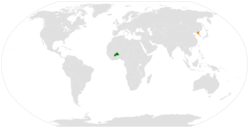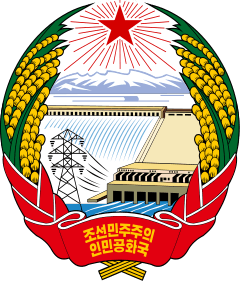Burkina Faso–North Korea relations
Burkina Faso–North Korea relations refers to the current and historical relationship between the Democratic People's Republic of Korea (DPRK) and Burkina Faso. Neither country maintains an embassy in the other, although the DPRK formerly had an ambassador accredited in the Burkinabé capital Ouagadougou.[1]
 | |
Burkina Faso |
North Korea |
|---|---|
History
Relations were especially close during the Cold War, when the DPRK was most active in foreign affairs. North Korea provided military equipment to the army of what was then the Republic of Upper Volta in the mid-1970s, during the reign of the military leader Colonel General Sangoulé Lamizana.[2] North Korea also provided agricultural and technical assistance during the Cold War.[3] Military aid continued under the rule of Captain Thomas Sankara, with an accord signed in 1983.[4] Sankara, a Marxist revolutionary, visited Pyongyang several times, first as Prime Minister on 13 March 1983 and then as President on 3 September 1985.[5][6] A DPRK–Burkina Faso Friendship Association reportedly existed during this period.[1]
Relations remained close during the early reign of Sankara's successor, Blaise Compaoré, who took power in a 1987 military coup. Compaoré visited Pyongyang in September 1988.[7] In the late 1980s there was several cases of cooperation between the two countries – for example, the DPRK constructed an open-air theatre in Koudougou,[8] and a trade agreement to exchange Burkinabé cotton and minerals for North Korean agricultural machinery was signed.[9] Diplomatic activity quieted down after the Cold War, but some cooperation continued. In 1998 the North Korean government completed the construction of five small water reservoirs in Burkina Faso.[10]
Straying from the traditional relations, Burkina Faso – a temporary UNSC member at the time – voted in favour of United Nations Security Council Resolution 1874 in 2009, imposing further economic sanctions on North Korea. In a statement, the Burkinabé representative said his country's vote was due to its commitment to a nuclear weapon-free world.[11]
Trade
In 2016, bilateral trade was worth US$34 million, making Burkina Faso North Korea's seventh largest trading partner.[12]
References
- North Korea Handbook. Armonk: M. E. Sharpe. 2002. pp. 902, 926. ISBN 076-563-523-2.
- Becker, Jasper (2005). Rogue Regime: Kim Jong Il and the Looming Threat of North Korea. Oxford: Oxford University Press. p. 149. ISBN 019-803-810-0.
- Smith, Hazel (2005). Hungry for Peace: International Security, Humanitarian Assistance, and Social Change in North Korea. Washington, D.C.: United States Institute of Peace Press. p. 164. ISBN 192-922-358-7.
- Metzler, John J. (1996). Divided dynamism: the diplomacy of separated nations: Germany, Korea, China. Lanham: University Press of America. p. 101. ISBN 076-180-235-5.
- Asian Almanac: Weekly Abstract of Asian Affairs. Singapore: V.T. Sambandan. 1983. p. 11792.
- Summary of World Broadcasts: Far East. London: British Broadcasting Corporation. 1985.
- Rupley, Lawrence; Bangali, Lamissa; Diamitani, Boureima (2013). Historical Dictionary of Burkina Faso. Lanham: Scarecrow Press. p. 57. ISBN 081-088-010-5.
- "Pyongyang-Sponsored "People's Theater" Completed in Burkina Faso". Naewoe Press. Seoul. 1988.
- Statistical Appendix to Minerals Yearbook. Washington, D.C.: United States Government Printing Office. 1988. p. 325.
- "Reservoirs built in Burkina Faso with DPRK help". Pyongyang. Korean Central News Agency. 22 January 1998. Retrieved 6 November 2014.
- "Text of United Nations Security Council Resolution 1874". UN Press Centre.
- Tweed, David; Leung, Adrian (31 May 2017). "Keeping North Korea Afloat Puts These Nations in Trump's Crosshairs". Bloomberg.
